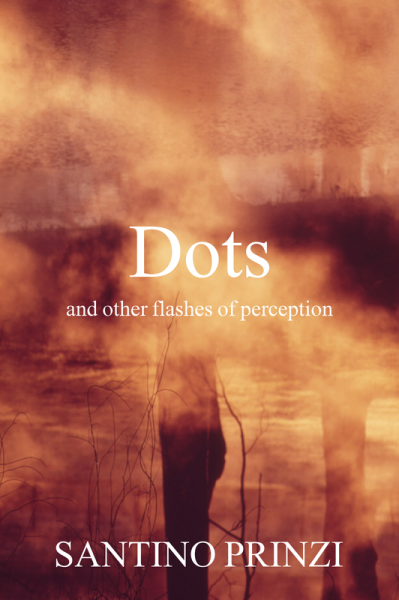
By Eshani Surya
Imagine the things you do in a day. See those small moments in succession: walk by the preacher on the subway, bake cookies or bread in the oven, try to flirt with the cashier at a local store, watch Netflix with increasing horror as the clock ticks forward, visit the bookstore, listen in on a conversation in a café.
In his debut collection of flash fiction, Dots: and other flashes of perception, Santino Prinzi walks his readers through daily lives, giving small actions and events weight. Prinzi moves away from the autopilot mode that so many of us exist in, trying to find meaning in what is often ignored. Even the stories that depict more specific and difficult circumstances (like “Calls for Ronan,” which deals with a transgender character and her mother’s inability to call her by the correct name) do so without grandiosity. In “Calls for Ronan” the story is told through phone calls, storytelling that reads as tangible rather than philosophizing. The effect of all this is a delicate collection, with stories that breathe whispers into the subconscious mind. On the inevitable day that a reader is mimicking the actions of a character from the book, it is entirely possible that a sentence from a story will rise up out of memory, and that reader will find themselves reconsidering their bodies and motivations.
For all his interest in the mundane, Prinzi others the experience of daily motions, making them deserving of further inspection. In “Halfway to Fifty,” Prinzi takes on Netflix and the phrase that the website asks: “Are you still watching?” For most, this is a screen we have encountered. We hit “Resume,” and go on. But Prinzi situates this image into questions of age and accomplishment. The first person narrator considers Netflix, then the length of centuries, then Facebook, then suicide, before returning to watching television. In this way, Netflix becomes a gateway for showing how technology ties its users to endurance.
Often, this othering is created through explicating violence. Much of the collection deals with forms of violence, both physical and emotional. This is most evident in the stories that handle deteriorating or unmoored relationships. In “Hereditary,” Prinzi depicts a mother and daughter who both kill their abusive husbands in the kitchen. In “Shelf Life,” Lisa and Nick meet in a bookstore. They follow each other through the sections, using the genres to guide the dynamic of their relationship. They end in Crime, where Lisa hides Nick’s unconscious body. These relationships have higher stakes with this clear violence, allowing Prinzi to show how precarious human affairs can be.
But violence is evident in other stories, as well, acting as a tie between the different parts of the collection. “Little Details” is also a relationship story, but it is the violence of betrayal, as a husband paints another woman’s portrait. In “Burnt Out,” a car is engulfed in flames in the night. Here, a blatant act of destruction is embedded into the scene. But even crueler is how the first person narrator talks about Janet in the morning, with no indication of even wanting to help the car’s owner when it caught fire.
Powerfully, most of the stories in Dots: and other flashes of perception consider the inherent violence in human actions. In this thematic space, Santino Prinzi is at the height of his critical prowess, uncovering truths that most people refuse to confront about their so-called mundane lives.

Eshani Surya is a current MFA student in fiction at the University of Arizona in Tucson, where she also teaches undergraduates. Her writing has appeared in Ninth Letter Online, New Delta Review, Lunch Ticket, Flyway: Journal of Writing & Environment, and more. She was the 2016 winner of the Ryan R. Gibbs Award for Flash Fiction from New Delta Review. Eshani also serves as a reader of fiction at Sonora Review. Find her on Twitter @__eshani.

 The core workshop of SmokeLong Fitness is all in writing, so you can take part from anywhere at anytime. We are excited about creating a supportive, consistent and structured environment for flash writers to work on their craft in a community. We are thrilled and proud to say that our workshop participants have won, placed, or been listed in every major flash competition. Community works.
The core workshop of SmokeLong Fitness is all in writing, so you can take part from anywhere at anytime. We are excited about creating a supportive, consistent and structured environment for flash writers to work on their craft in a community. We are thrilled and proud to say that our workshop participants have won, placed, or been listed in every major flash competition. Community works.